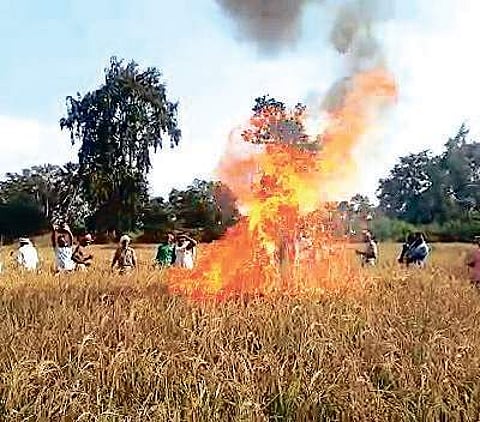

BHUBANESWAR: As massive pest attack and crop torching put Odisha Government on the backfoot, a latest study says that reducing role of agriculture extension has played a key part in the cultivators not receiving technical support in time.
While the suicide by Brundaban Sahu in Bargarh’s Kalapani brought the focus back on increased dependence of farmers on market driven plant control measures which eventually failed, it has also showed how Agriculture Department’s reduced role on the ground.
The study “Why Farmers Quit: A study on farmer suicides in Odisha” says that agriculture extension was key to success of the green revolution which was based on input-intensive farming as the extension wing put the practices on the field. However, now more and more farmers seek to avail the services but the extension wing seems to be on the backfoot.
“The farmers allege that they are not getting the support needed from the Department. Village agriculture staff members hardly visit their villages or fields. On the other hand, the agriculture extension has a grudge that it is understaffed with many positions lying vacant,” the report says.
With workload of various schemes and reporting responsibilities, these extension workers have less and less time for the farmers. The research study also said that farmers have been increasingly losing control of the agricultural processes a their dependence on market and government has grown manifold. It found that traditional seeds are not grown by a majority of the farmers.
Till a decade back, traditional seed varieties were used by the farmers but not now. Even for high yield variety seeds, only 20 per cent keep their own seeds while in 50 per cent cases, they are dependent on the Government while 30 per cent are the market-reliant.
While local knowledge is vanishing, farmers are more vulnerable as use of chemical fertilisers has exposed them to disease and pest attacks. Just like it has happened in Bargarh.
While high yielding variety seeds are preferred to traditional and organic inputs which are resistant to pests, extreme weather and moisture stress, the study reinforces the fact that it has increased the chances of crop loss. Government interventions, in such situations, have remained short of mark.
The study assessed the 2015 drought conditions and found that despite announcement by the Government to energise 13,000 lift irrigation points, majority remained dysfunctional. Similarly, the cluster bore-wells did not operate in many areas due to snags.